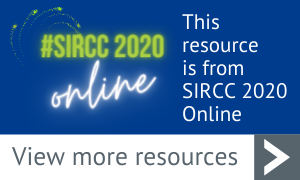SIRCC 2020 Online | Being the lighthouse
Topic: Residential care, SIRCC
Author: Louise Wallwein
In 2019 Louise Wallwein MBE gave a key note speech to the SIRCC Conference. Louise Wallwein is a published poet, playwright and participation artist. Using all of her experience, Louise highlighted themes within the speech relating to the role of practitioners both in residential and child care settings, records for children and young people, the need for a sense of connection and where the focus of attention should be in relation to our children and young people
Within this, Louise covered many pertinent issues being aware that the Independent Care Review was being undertaken at that time in Scotland, although The Promise was not published until February 2020.
Five short clips have been extracted to support reflection individually and/or discussion in your Service.
Being the lighthouse
Reflections and points for discussion
The image of a lighthouse has been used in a number of child care responses in relation to recovery services and projects to support children who have experienced different forms of harm. In this clip, Louise gives her own reflections as to how residential practitioners can be a 'lighthouse' for children, young people and their families.
'A guiding light may be needed as "when trauma comes back the lights go out'
- How might children and young people experience the light you provide, and what would it look like to them if you were to illustrate this?
- In order for lighthouses to continue to function to keep people safe they need a maintenance schedule (!) What do you think the maintenance plan should be for staff who are caring for children, young people and their families at this time?
The power of the written word
Reflections and points for discussion
In this clip Louise highlights, using her own experience, the impact of not having a shared history with someone else in "being a stranger everywhere"– and when there is a record of her experience– the impact of how this has been written.
- Louise makes a suggestion about a skill that could be developed with practitioners. Based on this – how could this become a possible reality, and what would enable this to happen?
- Reflecting on your current practice and those around you – what is one thing you can commit to do today that would make a change in this part of your role and/or Service?
Decision-making
Reflections and points for discussion
In this clip, Louise raises issues in the balance of decision making and when this shifts to the child in need of protection to the young person who is perceived to be a risk. Further to this, the responses that are given as a result.
The question surfaces as to whether young people are having ordinary responses to extraordinary experiences.
- There has been significant work in recent years in relation to recognising the signs of harm young people may experience – child sexual exploitation being one such example. How can we notice when our focus begins to shift in perceiving young people as a risk rather than being at risk of harm? What can we do to keep a level of awareness as to what may be informing our responses?
- Based on the theme of 'the power of everyday care' what therapeutic responses are possible to give when looking beyond the 'presenting behaviour'?
Finding yourself and a voice
Reflections and points for discussion
Louise discusses her experiences of the need for someone to have a shared history with who 'sees' you and supports with a sense of identity
- How do you currently support young people to find a voice?
- What do we understand identity to be?
We are not family, we are familiar
Reflections and points for discussion
Within this clip, Louise talks about conditional 'appropriate' relationships, the impact of waiting to move in 'constant transition' and relationships being time limited. Louise also makes a connection with the impact on the future adult self
- Our current system has "written in" messages about not continuing relationships with children and young people we care for in order to ensure there are safe 'boundaries'. Considering what Louise has said, and taking into account the Findings of the Independent Care Review what do you think the future could and should look like for caring relationships?
Who is Louise Wallwein?
Louise is a renowned and award-winning poet, playwright, and performer from Manchester, who is known as an explosive artist who 'detonates her audiences' imaginations'. Brought up in 13 different children's homes in England, Louise wrote her first play at the age of 17. Louise's career took off in 1998 and her plays have been broadcast by the BBC, graced the stage of the Sydney Opera House, Royal Exchange, and Contact Manchester. Louise has made 20 films with young people around the UK and continues to be in demand from artists, supporting them with mentoring.



